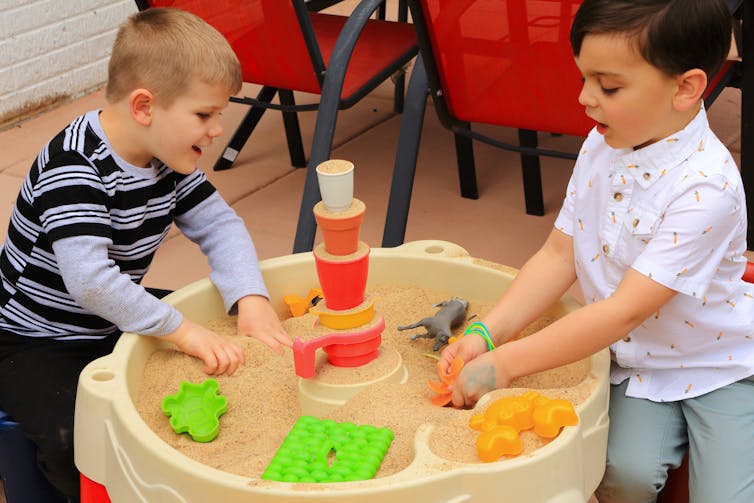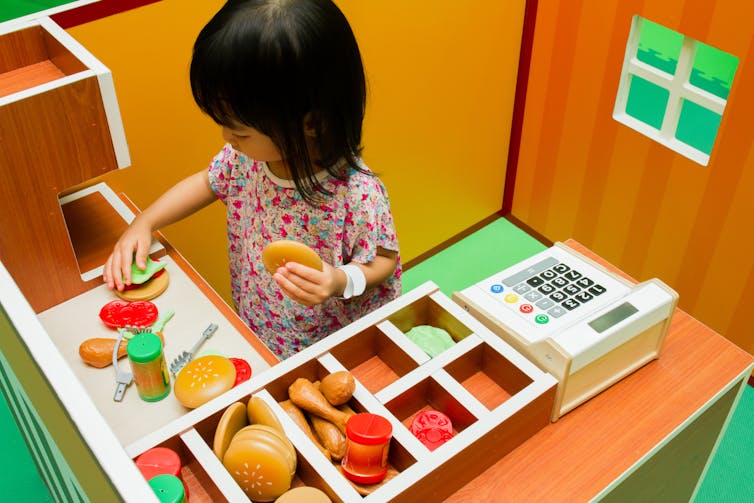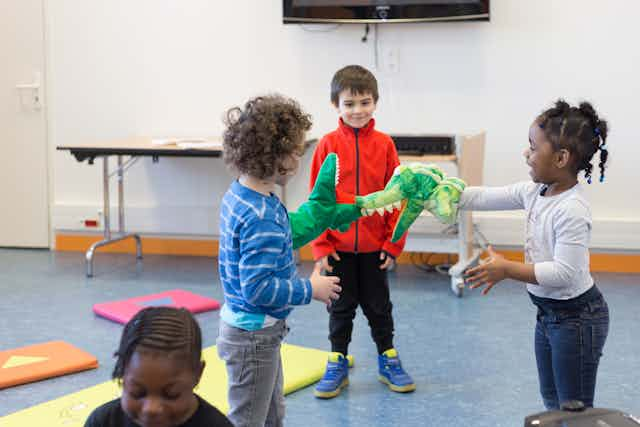Recent educational reforms have led to two fundamental changes in kindergarten classrooms.
Firstly, there has been a surge of play-based learning. Play, now shown to be beneficial both for academic skills and for socio-personal development, has been repositioned in many kindergarten policies as the dominant approach for teaching and learning.
Play-based learning is rooted in a history across traditions of early primary education such as Montessori, Reggio Emilia, Froebel and the British Infant School tradition.
Play is further supported as a basic right of all children by the United Nations Convention on the Rights of the Child. With Canada’s adoption of this in 1991, Canadian educators had empirical, historical and philosophical grounds for play as a basis for classroom learning.
At the same time, the accountability movement has made its way into kindergarten. This movement results in a dramatic increase in academic standards expected of kindergarten students, and the coupled need for teachers to assess and report achievement of curriculum standards.
Both play-based learning and the value of assessment are independently supported by research arguing their value. Yet little research has explored what happens when schools implement these changes simultaneously.
In our three-year study, we found that many teachers report assessment as one of the primary challenges within the current context of play-based kindergarten education.
Asking probing questions
Today, Ontario kindergarten teachers are mandated to use multiple forms of assessment. Overall, these practices have two purposes: firstly, to report on student learning of curriculum expectations through graded report cards; and secondly, to provide feedback to help students become independent learners, which is a fundamental goal for kindergarteners.
Providing feedback happens when teachers engage with children through teacher-led instruction or play-based learning.
For example: a teacher intentionally lingers near children at play. Two children can’t agree on an imaginary scenario, such as whether they are firefighters at a fire or adventurers riding horses to save a runaway train. The teacher asks probing questions to help children solve their own conflicts and imagine a story line.

At the same time the teacher is intentionally assessing children’s collaboration and their ability to use existing story structure knowledge.
Thus we can see how assessment — asking probing questions in this case — supports child development. Children are learning to compromise and come to a mutually agreeable consensus. They are also developing the ability to reflect critically on their own thinking.
When assessment is recorded and shared, parents and teachers can identify for students where they are and where they need to go with their learning. Educators and parents can then help provide children with strategies for this.
All assessment practices are meant to continuously monitor student development and learning towards provincial standards, both academic and socio-personal.
Teacher challenges
In our three-year study in Ontario play-based kindergarten classrooms, through a series of initial and follow-up interviews and classroom observations, we explored teachers’ perspectives and intentions about how they fulfil their mandates to assess children.
Teachers overwhelmingly described their intentions to practise child-centred assessment. Further, they stressed that play opportunities were purposefully designed to address curriculum expectations and that assessment in these contexts was essential. But our observations revealed that teachers were not always systematically doing this.
Instead, teachers used a traditional approach of creating multiple centres to engage the majority of children in play-based learning activities — for instance, at a sand table or an imaginary play setting like a restaurant.

Teachers then assessed the literacy or math skills of individual children, or small groups. An overwhelming majority of teachers in our study (95 per cent) indicated that they used such teacher-led stations because they lacked sufficient time to systematically assess children in all areas of the curriculum while they played.
This challenge was primarily due to large class sizes with up to 30 children. It was compounded by perceived pressure to cover and report on curriculum expectations in order to prepare children for Grade 1.
Over half the teachers (55 per cent) felt pressured to capture the multitude of learning moments occurring simultaneously among children in a busy classroom environment.
Teachers also recognized that a significant portion of their time was spent on pedagogical documentation — the practice of systematically collecting evidence on individual student learning throughout play and learning periods.
This practice is part of Ontario’s play-based kindergarten policy, and involves ongoing gathering and interpretation of various evidence of student thinking, learning and performance including photographs, videos, work samples, conversations and observations.
The addition of pedagogical documentation has not fundamentally changed how assessment operates in play-based kindergarten classrooms. Rather, as teachers work to navigate the assessments required by academic curriculum expectations and the learning potential within play-based contexts, teachers perceive more assessment work.
Class size impacts teachers’ assessment capacity
Assessing children one-on-one or in small groups served to resolve an additional challenge that 75 per cent of the teachers identified: a large proportion of children did not have the self-regulation to play for extended periods of time without adult support and supervision. They had issues with sharing their emotions, controlling their bodies and playing in socially appropriate ways with friends and resources.
While teachers’ strategies of creating the assessment stations appeared to be an effective and necessary approach, it meant that assessment was not fully integrated or responsive to play-based learning.
This observation led us to highlight an irony: despite many children entering kindergarten not having the necessary self-regulation to play independently for long periods of time, due to class size, teachers are unable to fully leverage the power of both play and assessment to develop children’s self-regulation.
Teachers in our study described the need to assess a diversity of academic and learning skills in multiple spaces for so many children as an impossible juggling act.
And, many acknowledged they did not have time to collect, let alone engage in, in-depth analysis of much of the assessment information collected.
Our findings suggest to us the need for administrators and teacher professional development programs to support teachers’ broader assessment literacy: in kindergarten, assessment is optimally not an add-on to teaching and learning, but part of everyday practices that combine both child-led and teacher-directed practices woven into play-based learning.
Importantly, our findings also suggest that teachers want to practice child-centred assessment, which effectively nurtures academic and socio-personal development, but report they cannot because of large class sizes.

